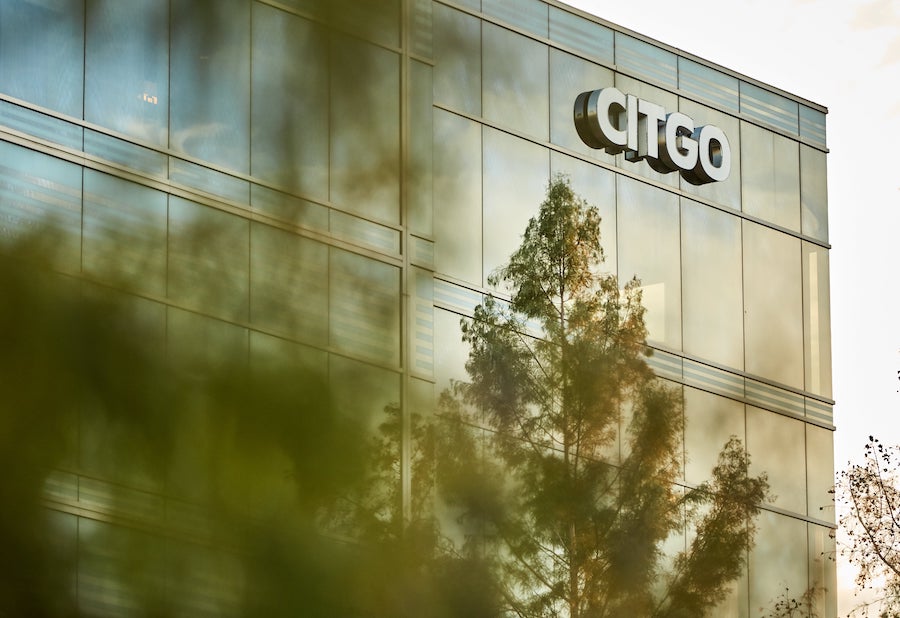Consortia Eye Citgo's Texas Refinery Ahead of Auction Deadline, Sources Say
(Reuters) — Citgo Petroleum's smallest and least profitable oil refinery has been thrust into the spotlight as a potential breakout candidate ahead of next week's court auction to pay over $20 billion in Venezuela-related claims, two people close to the process said.
Energy producers, refiners, investment funds and bankers increasingly have shown interest in the Venezuelan-owned company's Corpus Christ, Texas, complex during a marketing process organized by a U.S. court in Delaware.
Tuesday is the deadline for bids in the second and final round, the final step in a years-long process organized to pay creditors for past expropriations and debt defaults in Venezuela, which is expected to result in a change of the ownership of the seventh-largest U.S. refiner.
"At least a couple of consortia have shown interest in submitting bids with the only goal of keeping Corpus Christi," one of the sources said. "It's a major asset as seen by bidders."
Activist investor Elliott Investment Management has been weighing a bid, and investors represented by Centerview Partners have sought to lure ConocoPhillips, the largest creditor in the court-ordered auction, to join its effort, Reuters reported in April.
Located at the largest U.S. oil and fuel export hub, Citgo's 167,000-barrel-per-day (bpd) Corpus Christi refinery has emerged as a prized asset, the people said. Its proximity to U.S. shale fields and pipelines, and the 890-acre (360-hectare) site's storage facilities and seven docks have made it a standout among bidders.
Winner Takes All
Citgo's refineries in Louisiana, Illinois and Texas can jointly process 807,000 bpd of oil. In the last two years, the circuit has generated $4.8 billion in combined net earnings.
In 2019, Citgo severed ties with its ultimate parent, Caracas-headquartered state oil firm PDVSA, and since has operated under a U.S. license protecting it from creditors. Venezuelan opposition envoys are pressing the U.S. government to pause the auction until a presidential election in July.
In both bidding rounds, U.S. Judge Leonard Stark has restricted offers to all shares in Citgo's parent PDV Holding. That means that if a winner in the auction is interested only in a portion of the business, it must acquire all assets and later hive off unwanted properties.
Houston-based Citgo, which in recent months opened a data room to provide information to potential bidders, did not respond to a request for comment.
Premium Spot
Located on the Gulf Coast, Corpus Christi has emerged as the largest U.S. crude export hub with 2.2 million bpd moving in the first quarter this year. It is also key for moving fuels, which rose to some 932,000-bpd last year, data from the Port of Corpus Christi showed.
"Rapid, large-scale infrastructure development in the form of better dock capacity, inbound pipe capacity from the Permian and storage capacity has catapulted Corpus Christi into prime position for tidewater access for U.S. barrels," said energy consultancy Wood Mackenzie in a report last year.
Securing access to Corpus Christi's ports and pipelines for handling oil imports and fuel exports, as Citgo has, is viewed as key for energy companies seeking expansions.
Citgo's Corpus Christi refinery, which predominantly runs heavy crudes, is divided into east and west plants, linked by pipelines. The east plant is intertwined with the east plant of Flint Hills Resources' 343,000-bpd Corpus Christi refinery.
Koch Industries-owned Flint Hills is believed to have considered a bid or joining a consortium. The addition of Citgo's crude distillation unit could lead to a Koch facility with capacity of 510,000 bpd, and make it the seventh-largest U.S. refinery.
Koch is one of the creditors pursuing Citgo parent's shares through the Delaware case. The bidding process allows it to use its $456.5 million claim against Venezuela as a credit bid in the auction.
Koch did not reply to a request for comment.
Citgo's other refineries are in Lemont, Illinois, which is typically the second-most profitable plant due to its access to lower-cost Canadian crudes, and Lake Charles, Louisiana, the largest and most profitable of the three.
In the first quarter, Corpus Christi contributed $128 million to Citgo's earnings before interest, taxes and depreciation, compared with Lake Charles' $383 million and Lemont's $227 million, the company reported.
Corpus Christi ran last year at 84% of crude utilization, below the company's 93% average. The plant has been disrupted by several storms since 2017.
Citgo might not be using Corpus' full potential for fuel exports, leaving room for a buyer to make improvements, one of the people said. In the first quarter, Citgo exported a total 149,000 bpd, in line with the 147,000 bpd of 2023.
"It will be difficult to find a group interested in a (refining) circuit that is partially connected to Canada, and in another part embedded in the U.S. Gulf," another person said. "Chances of keeping it together are slim."
Related News
Related News

- Kinder Morgan Proposes 290-Mile Gas Pipeline Expansion Spanning Three States
- Valero Plans to Shut California Refinery, Takes $1.1 Billion Hit
- Three Killed, Two Injured in Accident at LNG Construction Site in Texas
- Tallgrass to Build New Permian-to-Rockies Pipeline, Targets 2028 Startup with 2.4 Bcf Capacity
- TC Energy Approves $900 Million Northwoods Pipeline Expansion for U.S. Midwest
- U.S. Pipeline Expansion to Add 99 Bcf/d, Mostly for LNG Export, Report Finds
- Enbridge Adds Turboexpanders at Pipeline Sites to Power Data Centers in Canada, Pennsylvania
- Great Basin Gas Expansion Draws Strong Shipper Demand in Northern Nevada
- Cheniere Seeks FERC Approval to Expand Sabine Pass LNG Facility
- US Poised to Become Net Exporter of Crude Oil in 2023





Comments